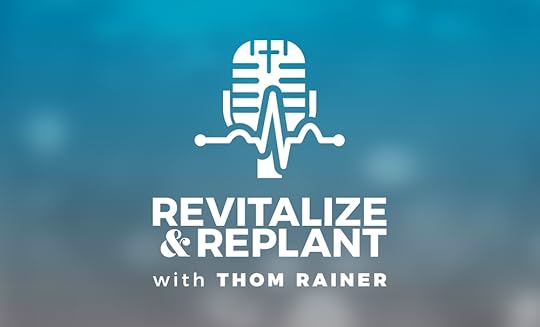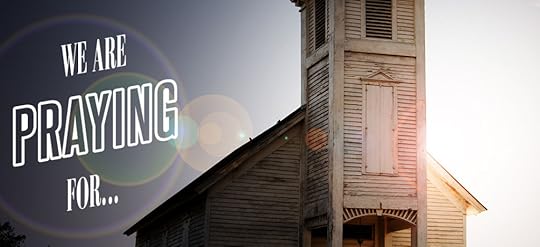Thom S. Rainer's Blog, page 132
January 31, 2019
The Unique Challenges of Revitalization in the Bible Belt – Revitalize & Replant #078

SUBSCRIBE TODAY:
iTunes • RSS • Stitcher • TuneIn Radio • Google Play • Spotify
The Bible Belt isn’t as unique as it once was in American culture. But revitalizing churches in the area often still requires some unique considerations.
This Week’s Question:
FROM AARON — I am finishing my seminary degree this semester and feel called to pastor in the Bible Belt. Since a lot of church revitalization is needed in the Bible Belt, what are some unique challenges of pastoring in the Bible belt?
Episode Highlights:
There’s not as much of a cultural divide in the Bible Belt as there used to be.
When we truly start to love Jesus more, we will start to love our neighbors more.
Just because someone may have joined a church earlier in life doesn’t make them truly a Christian.
Anyone who believes they are entitled to something from God, know the adversary has put that thought in you, not the Holy Spirit.
The seven reminders we cover are:
Understand what is not unique about the Bible Belt.
Clarify the “why” behind your sense of calling.
Understand the plague of cultural Christianity
Tactical patience is always important, no less so in the Bible belt
Deal with the issue of unregenerate membership
Be prepared to deal with an entitlement mentality
Remember, a Great Commission outward focus is key wherever you serve
Resources mentioned in this episode include:
ChurchAnswers.com
RevitalizeBundle.com
ChurchReplanters.com
Replanter Assessment
Find more resources at the Revitalize & Replant page at ThomRainer.com

Revitalize & Replant is sponsored by the North American Mission Board and ChurchReplanters.com. More than 10% of churches in North America are at risk of closing and the North American Mission Board is committed to reversing this trend by decreasing the death rate of existing churches while simultaneously increasing the birth rate of new churches. To learn more about what it means to become a replanting pastor or to explore resources for replanting and revitalization in your own church, visit ChurchReplanters.com.
Submit Your Question:
Do you have a question about church revitalization or replanting for us to use on the podcast? Visit the podcast page to submit your question. If we use it on the show, you’ll get a copy of Autopsy of a Deceased Church and Reclaiming Glory.
January 30, 2019
When You’re Called to Ministry Later in Life: Six Questions

The call to vocational ministry later in life is both exciting and challenging. It is exciting to know God is preparing you for another path and, perhaps, another place. It’s challenging because of issues related to family, finances, and training.
We often receive questions at Church Answers from those going into vocational ministry for the first time in their 40s and 50s, and even in their 60s. As we try to guide them toward next steps, we ask them a series of questions. These are the six most common questions:
Will you stay in your secular vocation for now? The answer to that question obviously has financial implications. But it also allows the minister to be a marketplace pastor, or worship leader, or executive pastor, or any other position.
Is your family supportive of your moving in this direction? This question is one that is obviously important at any phase of life or decision-making. It has profound implications when you are older. The change is often dramatic and life-altering for the entire family.
How will I train for ministry? Can you work in your current church in an internship or as a volunteer staff person? Will you go to seminary online? Are you and your family willing to relocate?
Where do you see yourself in five years? Are you moving toward a full-time vocational position? Or are you called and content to be a marketplace minister?
Where will you find opportunities to preach? This question, of course, is specifically directed toward those who sense God’s call to pastoral and/or preaching ministries. Where can you begin to fill a pulpit? Will it be in those situations where the pastor is out for a week or two? Or can you find an interim or part-time position at a smaller church in the area?
Do you have a mentor? This question is extremely important. You need someone to guide you in this new phase of life. You need someone to ask you questions. You need someone to hold you accountable. Is there a pastor you know who would be happy to walk alongside you? If not, we have mentors at Church Answers who will be glad to walk with you in this journey.
It is an exciting time to be called into vocational ministry. It is an especially exciting time when it happens later in life. God has used older leaders and ministers for hundreds of years. He certainly can and will use you.
You have my prayers as you embark on this exciting journey.
January 29, 2019
What Former Pastors Miss Most about Pastoring – Rainer on Leadership #506

Podcast Episode #506
SUBSCRIBE:
iTunes • RSS • Stitcher • TuneIn Radio • Google Play • iHeart Radio • Spotify
When pastors leave the pastorate, they inevitably miss certain things about pastoring. Today, we discuss the five we hear most frequently.
Some highlights from today’s episode include:
As a pastor, there is a certain fulfillment in preaching to the same people week after week.
If you’re going to be a part of a local church, give it your all.
When you pastor a local church, you are a shepherd in the community.
The five things former pastors tell us they miss most about pastoring are:
Preaching to the same people
Watching life transformation
Relationships
The variety and opportunities for ministry
Serving the community
Resources mentioned in today’s podcast
Church Answers
Rainer on Leadership is a member of the LifeWay Leadership Podcast Network
Episode Sponsors
 Vanderbloemen Search Group is the premier pastor search firm dedicated to helping churches and ministries build great teams. They’ve helped thousands of churches just like yours find their church staff and are uniquely geared to help you discern who God is calling to lead your church.
Vanderbloemen Search Group is the premier pastor search firm dedicated to helping churches and ministries build great teams. They’ve helped thousands of churches just like yours find their church staff and are uniquely geared to help you discern who God is calling to lead your church.
For more information, visit WeStaffTheChurch.com.
 The ministry landscape is changing, and the need for biblical training is more necessary than ever. It’s time to get your Master of Divinity degree. The M.Div —Midwestern Seminary’s flagship degree program — is the primary track for ministry preparation. At just 81 hours, the Midwestern M.Div offers a complete foundation for full-time ministry leaders, offering everything you need, and nothing you don’t. Join other students in vibrant Kansas City as you train in a unique collaborative environment focused on the local church or study online in your current ministry context. Midwestern Seminary is developing a discipleship culture devoted to the local church and committed to God’s unchanging Word. Why not start your training today?
The ministry landscape is changing, and the need for biblical training is more necessary than ever. It’s time to get your Master of Divinity degree. The M.Div —Midwestern Seminary’s flagship degree program — is the primary track for ministry preparation. At just 81 hours, the Midwestern M.Div offers a complete foundation for full-time ministry leaders, offering everything you need, and nothing you don’t. Join other students in vibrant Kansas City as you train in a unique collaborative environment focused on the local church or study online in your current ministry context. Midwestern Seminary is developing a discipleship culture devoted to the local church and committed to God’s unchanging Word. Why not start your training today?
Find out more at mbts.edu/mdiv.
Feedback
If you have a question you would like answered on the show, fill out the form on the podcast page here at ThomRainer.com. If we use your question, you’ll receive a free copy of Scrappy Church.
January 28, 2019
Mega Pastoral Vacancies in Megachurches

You could see it unfolding. Boomer megachurch pastors are retiring. The number grows every month. And, as we thought might take place, the churches are having difficulty finding their successors. In fact, we are seeing search committees or their equivalents taking longer and longer to find a pastor. This trend will soon become a crisis.
So, how did we get here? How did we get to the point where some of the largest churches in North America are having trouble finding pastors? Here are a few observations:
These churches have similar profiles of the type of pastor they want. And there aren’t many that meet that profile. I see it repeatedly. The requisite age is 38 to 49. The candidate must have proven leadership experience. The prospective pastor must currently be serving in a church with an attendance of 500 or more. Dynamic preaching is a given. Doctoral degrees are preferred but not mandated by all churches. Oh, and the candidate must be happily married with 2.6 children.
The number of Millennials who are in vocational ministry and meet the profile is small. I am amazed at the same prospective candidates I hear every time one of these growing vacancies unfolds.
Fewer Millennials are excited about leading a megachurch. They don’t view bigger as better. They want to plant themselves and their families in a community. They are not the prototypical ladder climbers.
Millennials are concerned about the large worship centers many megachurches have. They would rather have more services and more campuses than one large worship center. They see a number of megachurches that can’t come close to filling their current space even now.
Many search committees (or their equivalent) try to look for a pastor in the old traditional path. You know that path. Vote on a search committee. Have meetings every third week except on holiday weeks. Receive resumes without a filter. And if the church belongs to a denomination, ask the denomination to send the same recycled names. One recent exception, Mariners Church in Irvine, California, retained Vanderbloemen Search Group to take the non-traditional path and found a pastor in relatively short order. Too many of the megachurch search processes simply are old and stale.
Many megachurches did not have a succession plan. For the life of me, I don’t understand why. This process, if done well, could save a lot of time and heartache.
Because of the reasons noted above, we have a supply and demand crisis. The demand is growing, and the supply is small.
By the way, a megachurch by definition has a weekend average worship attendance of 2,000 and more. We are now seeing more churches with an attendance of 1,000 to 2,000 having the same challenges.
It is a problem. It is likely a crisis. Unless something changes, it can only get worse.
Photo Credit: Rockfordmark [CC BY-SA 4.0], from Wikimedia Commons
January 27, 2019
Pray for Life Church Smyrna

Location: Smyrna, Georgia
Pastor: Shell Osbon
Weekly Worship: 10:30 AM, Eastern
Fast Facts: Life Church Smyrna is celebrating 66 years of ministry with a rich history and a promising future. As a multi-generational and multi-cultural church, with families from more than 30 nations from around the world, their diversity has allowed them to reach people from all walks of life. Life Church Smyrna partners with more than 85 local and global missionaries and 36 local organizations which afford them the opportunity to take the gospel from our neighbors to the nations. Please pray that they will have an even greater impact upon their city by reaching more children, students, and families for Christ. Finally, pray that they will continue to become the church that God has designed them to be by His grace.
Website: LifeChurchSmyrna.com
“Pray for . . .” is the Sunday blog series at ThomRainer.com. We encourage you to pray for these churches noted every Sunday. Please feel free to comment that you are praying as well.
If you would like to have your church featured in the “Pray for…” series, fill out this information form..
January 26, 2019
Notable Voices and the Week in Review: January 26, 2019

From Around the Web:
Advice to Young Pastors — Thom Rainer
Being a first-time pastor or a pastor at a new church can be intimidating. Former pastor, Dr. Thom Rainer offers some advice to young pastors entering a new church for the first time.
Five Pastoral Promises We Need to Make — Facts & Trends
When the budget is lagging, when staff and volunteers resign, and when the critics pile on, how we react in those moments should be governed by a moment yet to come. I want to hear “well done” when that moment comes. Commit in 2019 to, above all, please the One who called you to this task.
10 Marks of a Happy Church — Chuck Lawless
Once in a while, I get to know a church that genuinely seems “happy.” I know that term is subjective, but I trust you get my point – these churches are just different from the church that is dealing with dysfunction and turmoil. Here are some markers of happy churches:
Changing Churches: One Pastor’s Experience with Pastoral Transition — Jesse Benack
It is hard to walk through a transition process without being awestruck at the sovereignty of God. People often speak of God opening a door of opportunity for a different ministry. But after multiple interviews, congregational meetings, votes of approval, real estate searches, and denominational credentialing, it is clear that hundreds of doors must be opened for the transition to take place.
This Week at ThomRainer.com:

Five Perspectives That Help Me Deal with Criticisms
As one who has received criticisms over the years, I want to share with you personally five perspectives that have helped me deal with them…READ MORE
Six Symptoms of a Dysfunctional Church
Severe theological errors are pervasive in the church.
The church is known as a “pastor-eater.”
The congregation experiences severe conflict.
Hardly anyone in the community knows the church exists.
The church is declining while the community is growing.
The church is “family owned and family operated.”
Understanding the Internet Church as a Entry Point to the Physical Gathering
by Thom Rainer and Jonathan Howe | Rainer on Leadership
http://media.blubrry.com/thomrainer/s3.amazonaws.com/TheExchange/Episode504.mp3
Reconsidering Worship Service Alternatives Beyond Sunday Morning
by Thom Rainer and Jonathan Howe | Rainer on Leadership
http://media.blubrry.com/thomrainer/s3.amazonaws.com/TheExchange/Episode505.mp3
Six Creative Ways to Deal with a Deteriorating Facility
by Thom Rainer and Jonathan Howe | Revitalize & Replant
http://media.blubrry.com/revitalizereplant/s3.amazonaws.com/TheExchange/RevitalizeReplant/RR-Episode077.mp3
January 25, 2019
Reconsidering Worship Service Alternatives Beyond Sunday Morning – Rainer on Leadership #505

Podcast Episode #505
SUBSCRIBE:
iTunes • RSS • Stitcher • TuneIn Radio • Google Play • iHeart Radio • Spotify
We are starting to see more and more churches offer alternative worship service times. Today we discuss the when, where, and how of this trend.
Some highlights from today’s episode include:
Sunday has become less and less sacred in our culture. To many, it’s just another day of the week with no significance.
Duplicating your Sunday morning service on Sunday evening is often the easiest way to add another worship service option for those in the community.
Many of our scheduling norms in churches is a holdover from times when U.S. was an agrarian society.
Alternative worship gatherings allow you to train up more leaders in your church.
The nine points we discuss are:
The number of Americans working on Sunday is growing
Theological issues must be settled
Re-purpose Sunday night
Do a community survey
Try at test service of six months
Use alternative services as equipping stations for leaders
Keep it simple
“Multi” is they key word today: multi-site; multi-venue; multi-days
Staff these services wisely
Resources mentioned in today’s podcast
Church Answers
Episode Sponsors
 The ministry landscape is changing, and the need for biblical training is more necessary than ever. It’s time to get your Master of Divinity degree. The M.Div —Midwestern Seminary’s flagship degree program — is the primary track for ministry preparation. At just 81 hours, the Midwestern M.Div offers a complete foundation for full-time ministry leaders, offering everything you need, and nothing you don’t. Join other students in vibrant Kansas City as you train in a unique collaborative environment focused on the local church or study online in your current ministry context. Midwestern Seminary is developing a discipleship culture devoted to the local church and committed to God’s unchanging Word. Why not start your training today?
The ministry landscape is changing, and the need for biblical training is more necessary than ever. It’s time to get your Master of Divinity degree. The M.Div —Midwestern Seminary’s flagship degree program — is the primary track for ministry preparation. At just 81 hours, the Midwestern M.Div offers a complete foundation for full-time ministry leaders, offering everything you need, and nothing you don’t. Join other students in vibrant Kansas City as you train in a unique collaborative environment focused on the local church or study online in your current ministry context. Midwestern Seminary is developing a discipleship culture devoted to the local church and committed to God’s unchanging Word. Why not start your training today?
Find out more at mbts.edu/mdiv.
 Vanderbloemen Search Group is the premier pastor search firm dedicated to helping churches and ministries build great teams. They’ve helped thousands of churches just like yours find their church staff and are uniquely geared to help you discern who God is calling to lead your church.
Vanderbloemen Search Group is the premier pastor search firm dedicated to helping churches and ministries build great teams. They’ve helped thousands of churches just like yours find their church staff and are uniquely geared to help you discern who God is calling to lead your church.
For more information, visit WeStaffTheChurch.com.
Feedback
If you have a question you would like answered on the show, fill out the form on the podcast page here at ThomRainer.com. If we use your question, you’ll receive a free copy of Becoming a Welcoming Church.
Reconsidering Worship Service Alternatives Beyond Sunday Morning – Rainer

Podcast Episode #505
SUBSCRIBE:
iTunes • RSS • Stitcher • TuneIn Radio • Google Play • iHeart Radio • Spotify
We are starting to see more and more churches offer alternative worship service times. Today we discuss the when, where, and how of this trend.
Some highlights from today’s episode include:
Sunday has become less and less sacred in our culture. To many, it’s just another day of the week with no significance.
Duplicating your Sunday morning service on Sunday evening is often the easiest way to add another worship service option for those in the community.
Many of our scheduling norms in churches is a holdover from times when U.S. was an agrarian society.
Alternative worship gatherings allow you to train up more leaders in your church.
The nine points we discuss are:
The number of Americans working on Sunday is growing
Theological issues must be settled
Re-purpose Sunday night
Do a community survey
Try at test service of six months
Use alternative services as equipping stations for leaders
Keep it simple
“Multi” is they key word today: multi-site; multi-venue; multi-days
Staff these services wisely
Resources mentioned in today’s podcast
Church Answers
Episode Sponsors
 The ministry landscape is changing, and the need for biblical training is more necessary than ever. It’s time to get your Master of Divinity degree. The M.Div —Midwestern Seminary’s flagship degree program — is the primary track for ministry preparation. At just 81 hours, the Midwestern M.Div offers a complete foundation for full-time ministry leaders, offering everything you need, and nothing you don’t. Join other students in vibrant Kansas City as you train in a unique collaborative environment focused on the local church or study online in your current ministry context. Midwestern Seminary is developing a discipleship culture devoted to the local church and committed to God’s unchanging Word. Why not start your training today?
The ministry landscape is changing, and the need for biblical training is more necessary than ever. It’s time to get your Master of Divinity degree. The M.Div —Midwestern Seminary’s flagship degree program — is the primary track for ministry preparation. At just 81 hours, the Midwestern M.Div offers a complete foundation for full-time ministry leaders, offering everything you need, and nothing you don’t. Join other students in vibrant Kansas City as you train in a unique collaborative environment focused on the local church or study online in your current ministry context. Midwestern Seminary is developing a discipleship culture devoted to the local church and committed to God’s unchanging Word. Why not start your training today?
Find out more at mbts.edu/mdiv.
 Vanderbloemen Search Group is the premier pastor search firm dedicated to helping churches and ministries build great teams. They’ve helped thousands of churches just like yours find their church staff and are uniquely geared to help you discern who God is calling to lead your church.
Vanderbloemen Search Group is the premier pastor search firm dedicated to helping churches and ministries build great teams. They’ve helped thousands of churches just like yours find their church staff and are uniquely geared to help you discern who God is calling to lead your church.
For more information, visit WeStaffTheChurch.com.
Feedback
If you have a question you would like answered on the show, fill out the form on the podcast page here at ThomRainer.com. If we use your question, you’ll receive a free copy of Becoming a Welcoming Church.
January 24, 2019
Six Creative Ways to Deal with a Deteriorating Facility – Revitalize & Replant #077

SUBSCRIBE TODAY: iTunes • RSS • Stitcher • TuneIn Radio • Google Play
Churches in need of revitalization often need facility help, too. Today we discuss ways to improve your facility without too much expense.
Today’s Listener Question from Morris:
Our facility is our biggest weakness as a church. It’s not used during the week, and we don’t have much money to improve it. How do we maximize its use and are there people who can help us improve it without it costing an arm and a leg?
Some highlights from today’s episode:
It’s often easier for churches to share facilities with religious non-profits due to sharing a common mission.
When you make your church facility available for public use, make sure you do it with a ministry-centric purpose.
Consider what immediate improvements could be made to your facility and see if your church could be the subject of another church’s missions project.
The easiest way to know what improvements your facility needs is to conduct a church facility audit.
The six ideas that we discuss are:
Share space with a non-profit
Create a partnership with an ethnic church
Find out what you can do immediately to a facility
Seek an renovation ministry to come to your church
Use the facility for community events
Ask the city if they could use the church facilities
Resources mentioned in this episode include:
Church Facility Audit
Cool Solutions
Revitalize Network
ChurchReplanters.com
Replanter Assessment
Find more resources at the Revitalize & Replant page at ThomRainer.com

Revitalize & Replant is sponsored by the North American Mission Board and ChurchReplanters.com. More than 10% of churches in North America are at risk of closing and the North American Mission Board is committed to reversing this trend by decreasing the death rate of existing churches while simultaneously increasing the birth rate of new churches. To learn more about what it means to become a replanting pastor or to explore resources for replanting and revitalization in your own church, visit ChurchReplanters.com.
Submit Your Question:
Do you have a question about church revitalization or replanting for us to use on the podcast? Visit the podcast page to submit your question. If we use it on the show, you’ll get a copy of Scrappy Church and Reclaiming Glory.
January 23, 2019
Six Symptoms of a Dysfunctional Church

Six Symptoms of a Dysfunctional Church
Severe theological errors are pervasive in the church.
The church is known as a “pastor-eater.”
The congregation experiences severe conflict.
Hardly anyone in the community knows the church exists.
The church is declining while the community is growing.
The church is “family owned and family operated.”
Some highlights from today’s Rainer Report:
Are things in your church going according to God’s plan?
Do non-Christians in your church’s community know your church exists? Does it have a good reputation with non-members?
If your community doesn’t know your church exists, you have a problem.
Most churches that die are in highly populated areas.



